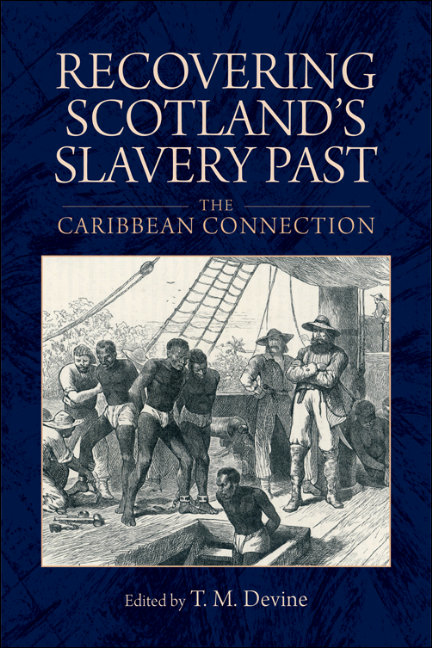Book contents
- Frontmatter
- Contents
- List of Illustrations and Tables
- List of the Contributors
- Acknowledgements
- Foreword
- map
- Introduction: Scotland and Transatlantic Slavery
- 1 Lost to History
- 2 Yonder Awa: Slavery and Distancing Strategies in Scottish Literature
- 3 Early Scottish Sugar Planters in the Leeward Islands, c. 1660–1740
- 4 The Scots Penetration of the Jamaican Plantation Business
- 5 ‘The habits of these creatures in clinging one to the other’: Enslaved Africans, Scots and the Plantations of Guyana
- 6 The Great Glasgow West India House of John Campbell, senior, & Co.
- 7 Scottish Surgeons in the Liverpool Slave Trade in the Late Eighteenth and Early Nineteenth Centuries
- 8 Scotland and Colonial Slave Ownership: The Evidence of the Slave Compensation Records
- 9 ‘The Upas Tree, beneath whose pestiferous shade all intellect languishes and all virtue dies’: Scottish Public Perceptions of the Slave Trade and Slavery, 1756–1833
- 10 ‘The most unbending Conservative in Britain’: Archibald Alison and Pro-slavery Discourse
- 11 Did Slavery make Scotia Great? A Question Revisited
- Conclusion: History, Scotland and Slavery 246
- Index
6 - The Great Glasgow West India House of John Campbell, senior, & Co.
Published online by Cambridge University Press: 15 December 2017
- Frontmatter
- Contents
- List of Illustrations and Tables
- List of the Contributors
- Acknowledgements
- Foreword
- map
- Introduction: Scotland and Transatlantic Slavery
- 1 Lost to History
- 2 Yonder Awa: Slavery and Distancing Strategies in Scottish Literature
- 3 Early Scottish Sugar Planters in the Leeward Islands, c. 1660–1740
- 4 The Scots Penetration of the Jamaican Plantation Business
- 5 ‘The habits of these creatures in clinging one to the other’: Enslaved Africans, Scots and the Plantations of Guyana
- 6 The Great Glasgow West India House of John Campbell, senior, & Co.
- 7 Scottish Surgeons in the Liverpool Slave Trade in the Late Eighteenth and Early Nineteenth Centuries
- 8 Scotland and Colonial Slave Ownership: The Evidence of the Slave Compensation Records
- 9 ‘The Upas Tree, beneath whose pestiferous shade all intellect languishes and all virtue dies’: Scottish Public Perceptions of the Slave Trade and Slavery, 1756–1833
- 10 ‘The most unbending Conservative in Britain’: Archibald Alison and Pro-slavery Discourse
- 11 Did Slavery make Scotia Great? A Question Revisited
- Conclusion: History, Scotland and Slavery 246
- Index
Summary
WHEN THE HISTORIAN John Guthrie Smith majestically surveyed the landed estates of the West of Scotland in The Old Country Houses of the Old Glasgow Gentry in 1878, he cited one family in particular that epitomised Glasgow's elite ‘sugar aristocracy’:
The Campbells of Possil, or rather of John Campbell sen. & Co., deserve more than a passing notice. They were a representative family of those West India magnates, who came after the Virginia Dons, and came in for much of their social and commercial supremacy … [The sugar trade] probably was never entitled to the consideration it got. Being in few hands, it yielded fortunes that bulked in the public eye, and less showy trades may have been of more real importance … It left behind it no single fortune equal to the largest fortunes left by the tobacco trade.
In his landmark study The Price of Emancipation, Nicholas Draper underlined the exceptional standing of the great merchant house of John Campbell, senior, & Co. On the abolition of plantation slavery in 1834, partners in the firm received over £73,000 compensation, which ranked the merchant house as the eighth-largest ‘mercantile beneficiary’ in Great Britain and the highest in Scotland. Given their prominence and the availability of business records, it is surprising the firm has not attracted serious attention by historians. This case study will address this lacuna, thus adding to a developing historiography on Scottish– West India merchants, planters and firms in the colonial period.
The rise of the firm in Glasgow, including capital stock and partnership structure, can be traced in some detail from surviving business records. This will be placed in a transatlantic context. The colonial activities of the firm will be illustrated through dealings with correspondents in Scotland and the Caribbean. Early commercial ventures in Grenada and Carriacou provided the foundation for the firm's later expansion into the frontier colony of Demerara, which was joined with Berbice and Essequibo to become British Guiana in 1831. Colonial operations will be outlined through deeds and mercantile correspondence. Finally, the firm's compensation claims and the financial interests of co-partners will be traced through parliamentary sources, and wills and confirmation inventories generated on the death of individuals concerned.
- Type
- Chapter
- Information
- Recovering Scotland's Slavery PastThe Caribbean Connection, pp. 124 - 144Publisher: Edinburgh University PressPrint publication year: 2015



